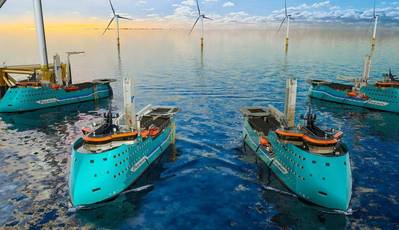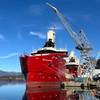Acta Marine Orders Methanol-fueled CSOVs
Dutch offshore services provider Acta Marine announced it has signed a contract for the construction of two methanol MDO/HVO powered DP2 construction service operation vessels (CSOVs) at Turkish shipyard Tersan with two optional vessels for delivery at a later stage. The vessels are primarily aimed at the offshore wind construction market and carry the new SX-216 TWIN-X Stern design from Ulstein Design & Solutions AS that was exclusively designed for and in cooperation with Acta Marine.
“Acta Marine is growing along with the offshore wind construction market by ordering these two vessels while remaining one of the leaders in this field. The dedicated SX-216 design with a TWIN-X stern, an integrated walk-to-work gangway system and 3D crane and its hotel style accommodation represents a next step in responding to the market needs,” says Rob Boer, managing director at Acta Marine. “A first in offshore wind this vessel will be capable of operating on dual fuel methanol and MDO/HVO enabling a strong carbon footprint reduction in the near future in combination with a battery power system.”
The CSOVs have a hybrid power solution, with green methanol intended as the main source of energy. The dual-fuel engines are supported by a battery package.
“Being a leading actor in the renewable energy business, it is paramount to be prepared for a future where zero or low-carbon fuels are available. Acta Marine has a strong wish to offer their clients the largest possible reduction of emissions straight from delivery of the vessels. Therefore, these vessels required a practical and timely available solution to reduce their carbon footprint from the outset of the design,” said Erwin Jager in Ulstein Design & Solutions AS.
“The carbon footprint of marine gasoil (MGO) makes MGO non-sustainable as the sole choice for the future. Currently, the decision on what alternative fuel to focus on can be overwhelming as it is affected by many factors internally and externally. Through a decision support process, developed by Ulstein to guide owners in the myriad of choices to be made, a matrix of alternative fuels has been evaluated towards a set of criteria unique to the shipowner and the business case. Through this process, methanol came out as the winner for this project, with the best overall score. The energy density and storage of methanol is favorable, it is an accessible energy source, and there are dual-fuel engines available in the market that can handle both methanol and diesel,” Jager said.
As soon as methanol had been chosen as an alternative energy source, Ulstein Design & Solutions started to adapt the design, implementing the methanol bunkering, tank and system layouts on a conceptual level.
Acta Marine said it sees methanol as one of the most viable alternatives to minimize its carbon footprint in the marine space and more specifically for offshore vessels. “Dual fuel methanol driven propulsion trains score high in terms of technology readiness and are eligible for further enhancement to a single fuel methanol upgrade at a later stage. This will allow early application of significant CO2 reduction measures now, while still allowing net-zero operations over the life of the ship," said Simon Anink, general manager at Acta Marine.
The CSOV measures 89 meters in length, 19 meters in width and accommodates up to 135 people in 85 cabins. It will be equipped with an SMST provided motion compensated gangway system, mounted on an integrated tower with height adjustment and a personnel/cargo lift. Additionally, the vessel features an SMST 3D-motion compensated crane with 6t lifting capacity. Cargo area is 500 square meters indoors, and 500 square meters outdoors. The vessel shall provide for walk-to-work transfer of personnel and cargo, efficient and safe in significant wave-heights (Hs) up to 3 meters.
Acta Marine’s new CSOVs can take on assignments in commissioning and construction of offshore wind farm installation phase and perform maintenance tasks on completed wind farms. The first two vessels are scheduled for delivery in the second and third quarters of 2024.
















